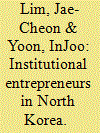| Srl | Item |
| 1 |
ID:
072989


|
|
|
|
|
| Publication |
2006.
|
| Summary/Abstract |
This paper sheds light on aspects of functionalism and neo-functionalism in the Sunshine Policy and evaluates its contribution to inter-Korean relations through statistical analyses. On the whole, the policy could increase the trade volume and diversify trade structures encompassing primary and secondary industries, as well as processing-on-commission-based trade in economic sectors. Our research results demonstrate that the policy has contributed to the progress of inter-Korean relations in socio-economic areas. Notwithstanding the increasing economic gap between the North and South, inter-Korean trade has expanded in the context of the economic urgency of the North and the mutual benefits of inter-Korean cooperation. In social sectors, the Kim Dae Jung government in comparison to previous governments encouraged personal exchanges, and these personal contacts should enhance mutual understanding between the North and South Korean people. In political and military sectors, the Sunshine Policy has been less positive in the current military build-up by both Koreas. Since the security issue of the two Koreas is the most vital factor for survival, broad and long-term perspectives based on mutual reliance and trust are needed.
|
|
|
|
|
|
|
|
|
|
|
|
|
|
|
|
| 2 |
ID:
088718


|
|
|
|
|
| Publication |
2008.
|
| Summary/Abstract |
This paper examines North Korean economic and policy changes since 1984 from an institutional perspective by focusing on the following four critical junctures: the Law of the Management of Joint Ventures in 1984; the policy of special economic zones in 1991; the mass starvation from 1995 to 1998; and the Economic Improvement Measures in 2002. How did broad situational change play a role in the North Korean government's policy changes and how did the policy changes contribute to institutional change in the North? Were there any policy conflicts among the North Korean elite? How did power struggles among the elite influence policy outcomes? The paper argues that a specific institutional area's arrangement is broadly divided into two categories of rules and norms: one set of hegemonic and several sets of non-hegemonic rules and norms. The hegemonic rules and norms define the main features of an institutional order. Each set of non-hegemonic rules and norms compete with the hegemonic for the dominant status in institutional settings. This competition between hegemonic and non-hegemonic rules and norms functions as the medium of institutional development. Since 1984, the contention between hegemonic socialist and non-hegemonic capitalist rules and norms has defined economic institutional change in North Korea.
|
|
|
|
|
|
|
|
|
|
|
|
|
|
|
|
| 3 |
ID:
109223


|
|
|
|
|
| Publication |
2011.
|
| Summary/Abstract |
This paper analyzes North Korea's private business entities that are considered to be "shadowy" for three reasons: First, shadowy private enterprises (SPEs) are "not officially recognized" as legitimate corporate entities by the government. Second, they are "not permitted to be registered" in the official enterprise list. Third, because of these two reasons, they are "ostensibly unidentified" under the country's socialist economy. The paper classifies SPEs into two categories: SPEs that are officially state-owned enterprises (SOEs) but are private in nature (financed and managed by private individuals) and those emerging in newly created economic areas. As institutional entrepreneurs, SPEs represent the interests of various market forces, leverage resources to develop market institutions, and contribute to the transformation of economic institutions. This article was funded by Korea University.
|
|
|
|
|
|
|
|
|
|
|
|
|
|
|
|
| 4 |
ID:
099679


|
|
|
|
|
| Publication |
2010.
|
| Summary/Abstract |
By citing North Korean sources, the South Korean media have recently delivered the news that Kim Jong Il had already chosen his third son, Kim Jong Un, as his political successor in late 2008 or early 2009. He selected a son who was still young and inexperienced. What was the reason behind this decision? This paper attempts to provide a convincing answer to this perplexing question. According to institutionalists, individual actors develop an institution, and the institution in turn affects the actors and restrains their choices. We argue that, among the many political institutions in North Korea, those closely linked to the cult of the Kim Il Sung family are directly related to the logic behind the political succession decision. The institutionalization of the cult of the family provides a justification for political succession in the state. Kim Jong Il has been one of the chief architects of the institutionalization of the cult, and the institutionalization in turn has limited his choice in selecting his successor, leading to the recent dynastic decision.
|
|
|
|
|
|
|
|
|
|
|
|
|
|
|
|
| 5 |
ID:
113878


|
|
|
|
|
| Publication |
2012.
|
| Summary/Abstract |
Focusing on the early stage, this paper compares the Kim Il Sung-Kim Jong Il succession with the Kim Jong Il-Kim Jong Un succession. Analyzing their differences and similarities, the study attempts to provide a better understanding of the leadership formation of Kim Jong Un, who now rules North Korea.
|
|
|
|
|
|
|
|
|
|
|
|
|
|
|
|